A Conversation With Angela Adair-Hoy and M.J. Rose
by Claire E. White
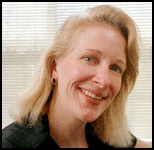 |
Called the poster girl of epublishing by Time magazine, Melisse Shapiro, who writes under the pseudonym M.J. Rose, has become one of the most recognizable voices to come out of the Internet revolution. In March 1999, her erotic thriller Lip Service, was the first ebook discovered online, and was picked up by the Doubleday Book Club and Literary Guild. It was then published by Pocket Books in August, 1999.
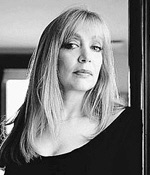 |
A shy girl, Melisse preferred reading and going to museums over games and athletics. She studied art in college, and graduated with a B.F.A. She then went to work as a copywriter for a New York City ad agency. By the time she was 30, she was the successful creative director of another ad agency. One of her commercials for the NYPD is in the Museum of Modern Art's Broadcast Department. But she never forgot her dream of being a novelist.
As part of her job, she had the opportunity to listen in on over 5,000 focus groups in which women from all over the country talked about what kind of fiction they wanted to read, what kind of romance they looked for in a book, and what sort of erotic content a great read should offer. Women were saying they wanted erotica, they wanted a plot, and an intelligent story. After two years of hard work, two novels in the desk drawer, and several screenplay options, M.J. Rose had the Lip Service manuscript complete and ready to sell.
After numerous rejections from agents who said they loved the book, but who thought it would be too difficult to market, she decided she had had enough. She knew she had an audience, she just had to reach them. So she used her advertising savvy and turned to the Internet to promote her book, selling her wedding and engagement ring left over from her recent divorce to finance the website which offered a downloadable version of the book. Realizing that putting a downloadable erotic novel on the Internet might bring some crazies out of the woodwork, she chose the pseudonym M. J. Rose. After a massive online marketing campaign, she became the first author to have her book discovered on the Internet and to be offered a contract by a major New York publisher. She estimates that she spent six hours a day, about four days a week, for six months contacting ezines, print magazines and newspapers that might review her book, joining mailing lists and newsgroups to let her audience know about the book, and getting radio interviews and online chats.
Now a journalist for Wired.com and a successful author, she lives in Connecticut with her partner, singer, composer and songwriter Doug Scofield. Ten percent of the proceeds of her books go the Yale New Haven Organ Transplant Unit.
Angela Adair-Hoy is one of the most prolific and profitable self-published authors on the Internet today. Sales for her own ebooks (five of them) generate more than $5,000 every month. Angela is the co-owner of epublisher Booklocker.com (which pays up to 70% royalties) and WritersWeekly.com, the free marketing e-magazine for writers, which distributes freelance job listings and new paying markets to more than 49,000 freelance writers every week. A well-known and respected figure in the online self-publishing/freelance writing community, she is a frequent speaker at conferences on the subjects of epublishing. She is also a passionate advocate for the rights of writers.
But just two years ago, she was a single mother of three trying to figure out how to make enough money just to keep food on the table and keep the electricity running. As she relates, "I was unemployed for the first time in 13 years, recently divorced and a single mother of three receiving no child support, my refrigerator was broken, my pantry was so bare it echoed, and I could go on and on. But God works in mysterious ways and my destitute Spring turned out to be the financial catapult for my publishing career." After answering the same questions by email day after day to writers who wanted her advice, she realized that she had answers to the questions that a lot of writers had. She sat down at the computer and began typing what was to become How to Publish a Profitable E-mag. She put an ad in her newsletter, the orders began piling up -- and the rest is history. She is now remarried, to marketing expert Richard Hoy; they live in Bangor, Maine with their three children.
Angela and Richard subsequently purchased
We talked with MJ and Angela about their new book, how they each got their start in the online world, and what authors must know if they are considering the self-publishing option.
When did you first know that you wanted to be a writer?
M.J.: As early as six years old when I first began writing short stories. I was sitting at my grandfather’s typewriter pecking out a short story about a man who wore five hats and very large green shoes. My mother asked me what I was doing and I told her I was practicing writing for when I grew up. She loved that and at dinner that night announced to the family that I had decided to be a writer. I took a detour away from writing when I was 17 and studied art in college. But I didn’t stay away long and was back to writing fiction by the time I was 25.
Angela: 10th grade. My English teacher gave me an A+ on a book report I wrote for a book I hadn't read. She wrote "Good BS" on the top.
What did you like to read when you were a child?
M.J.: Everything I could get my hands on -- especially books that were too old for me. But my favorite book was A Secret Garden.
Angela: I read Reader's Digest cover to cover every month. Also read all the Little House on the Prairie books, the Great Brain series and all the Judy Blume books.
What led up to your decision to self-publish your first book as an ebook?
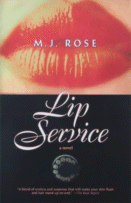
|
Angela: I'd heard so many horror stories from authors who had gone the traditional route. And, I was greedy. I knew I could sell my book myself. Why share the wealth with someone else?
What kept you going during your most challenging times?
M.J.: The desperate knowledge that I am a writer and I needed readers in order to keep writing. That and everyone telling me my scheme would never work.
Angela: Honestly, the need to feed my children. I had to keep working because I was a single mom with no child support. Children are a tremendous motivator.
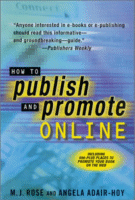
|
M.J.: Once I got some press for what I'd done with Lip Service I began getting hundreds of letters from writers asking for advice -- I started to answer each personally and realized I was in effect writing a book with my answers.
Angela: M.J. Rose called me one day and said, "I'd like to write a book with you." She and I had, combined, the most experience and success with ebooks. It was a natural fit.
What was the collaboration process like? What was the greatest challenge of co-authoring a book?
M.J.: It was a breeze. We did an outline -- assigned each other sections and got to work. There were no challenges. We had a lot of fun and worked together really well.
| "I always advise writers not to give up all rights....Authors should only go with non-exclusives and should never sign a long-term contract." --Angela Adair-Hoy |
(For Angela) As the owner of an epublishing company, Booklocker.com, what is the most common mistake that you see that first-time authors make?
Angela: Lots of typos. Writers don't understand that when you've looked at your own book for hundreds of hours, you don't see those typos and grammos (grammatical errors) any more. You must have an editor.
(For M.J.) What was the strangest thing that has happened to you on a book tour?
M.J.: The one stop where no one showed up and I wound up reading a children's book to a group of kinds -- not one that I'd written -- just one of my favorites. Eloise.
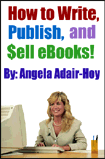
|
M.J.: Start with easy places to get reviews and send those first reviews with your pitch letter to the more serious review sites. Keep adding the best and most important reviews to your pitch letter.
Angela: The problem is not with self-published books. It's with the book's format. Reviewers (most anyway) will happily review a self-published book if it's in print. It's the ebooks that many still shy away from. I recommend writers print their own books through print on demand and distribute them to reviewers that way.
How has the Internet changed since you first came online?
M.J.: It's more crowded, but also there are more resources available.
Angela: Lots more people online now! People seem to play more by the rules now. It's not a free-for-all because people are being educated about what not to do online.
Have you ever faced writer's block? If so, how did you overcome it?
M.J.: Nope -- I have other problems, but not that one.
Angela: Not yet!
| "Start with baby steps, not giant dreams. Don't start with writing a bestseller. Start with writing a good line. Don't self-publish hoping to get rich. Do it hoping to find ten readers who will become stalwart fans." -M.J. Rose |
M.J.: That it is a replacement for print.
Angela: Many authors think that they must give up all rights to their books and sign long-term contracts. Absolutely incorrect. I see authors signing contracts with start-up epublishers who have no business taking rights away from authors. Authors should only go with non-exclusives and should never sign a long-term contract.
How do you think the recent economic downturn will affect the publishing and epublishing sectors?
M.J.: It's too soon to tell.
Angela: The companies that will be affected will be the ones with weak business models...too many investors, too much debt, and not enough income to sustain their regular expenses. Booklocker.com is debt-free, so we're here to stay.
I'm going to ask you to look ahead 10 years. Do paperback books even exist in print format? Do magazines and newspapers? In 20 years?
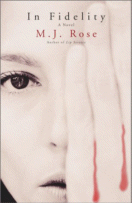
|
Angela: Yes. However, you'll be able to find any book you want online for instant download. You'll have to search for it in print. Bookstores will be printing books on demand, while customers wait. Book warehousing (and that tremendous waste of trees) will become a thing of the past.
What should a first-time author who wishes to self-publish look for in an ebook publisher? What are some of the warning signs that the epublisher may not be reputable?
M.J.: Get recommendations from other writers. Have a lawyer look over the contract. Don't sign an exclusive contract under any circumstances. And don't just do an ebook -- you must do a POD book too. Right now ebooks are best as marketing devices for print books.

|
What about royalties on self-published ebooks? What kind of percentage should an author be looking for?
M.J: At least 50%. 70% is preferable.
Angela: If the author is doing all the leg-work, he/she should never take less than 50%, preferably more. Booklocker pays 70% royalties on ebooks.
Of all the methods you have used to promoted your work online, what do you feel were the most important contributors to your success?
M.J.: Constancy -- no one method, but using all methods all the time.
Angela: My emag, WritersWeekly.com, is my weekly, free advertising vehicle. That is the key to my success. It goes out to 49,000 freelancers every Wednesday.
(For M.J.) What is your advice to a first-time author who has a finished manuscript and is trying to decide whether to find an agent and attempt to go the traditional publishing route or to self-publish the work? What are some of the factors he or she should consider?
M.J.: Absolutely try to find an agent and go the traditional route first. 80% of all books are sold in bookstores. You want to be where the books are. Plus if an agent wants your book -- even if he or she can't sell it -- you'll get objective feedback. Your mom, spouse, siblings and friends are not judges and you can't count on them. Don't publish yourself, unless you know for sure from outside sources that your project has merit. I believe self-publishing should be a last resort. I think young authors should try to get agents and get published traditionally. They need editors to help them grow and improve. Self-publishing is very arduous and very speculative and a difficult journey.
Unquestionably, the Internet has provided great benefits for our society, especially for writers. But do you see any downside to the massive technological advances of the last decade and the proliferation of home computers?
M.J.: There are and will be even more a proliferation of ebooks and no way for the readers to separate the wheat from the chaff.
Angela: No.
How do you juggle your professional and your personal life? Do you have any tips for our readers?
M.J.: I don't -- I don't have much of a personal life anymore.
Angela: Be able to separate yourself from work and play. Once I turn off my computer at night, I am wife and mom.
It's clear that you are both self-starters. So many people have a dream, but seem to fail when it comes to following through on what needs to be done to achieve that dream. What would you say to someone who has a dream, but hasn't a clue how to start to make it come true?
M.J.: Start with baby steps, not giant dreams. Don't start with writing a bestseller. Start with writing a good line. Don't self-publish, hoping to get rich. Do it hoping to find ten readers who will become stalwart fans.
Angela: The term "never give up," while sounding like a hollow echo, really rings true. I had many opportunities to throw in the towel, but I continued to strive and sweat to be successful. Had I quit, I'd be wearing pantyhose and be a corporate slave right now instead of laying in my bed, watching TV and typing interview answers on my laptop. And, I'd still live in that dingy house in Texas instead of this massive house on the river in Bangor, Maine.
If you were magically granted a week anywhere in the world with no responsibilities or deadlines, where would you go and what would you do?

M.J.: Take off with the man I live with and our pooch and go to some place warm and sunny in the Mediterranean.
 Angela: I'd take a 7-day road trip with Richard and
kids...and leave this danged machine
at home! I love road trips. Anywhere is fine, as long as there's no schedule and
lots of places to stop and see.
Angela: I'd take a 7-day road trip with Richard and
kids...and leave this danged machine
at home! I love road trips. Anywhere is fine, as long as there's no schedule and
lots of places to stop and see.
Return to the April 2001 issue of The IWJ.
More from Writers Write
